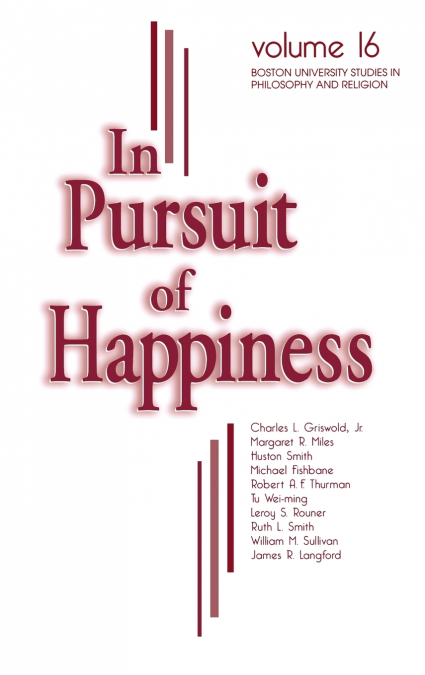
 Librería Desdémona
Librería Desdémona
 Librería Samer Atenea
Librería Samer Atenea
 Librería Aciertas (Toledo)
Librería Aciertas (Toledo)
 Kálamo Books
Kálamo Books
 Librería Perelló (Valencia)
Librería Perelló (Valencia)
 Librería Elías (Asturias)
Librería Elías (Asturias)
 Donde los libros
Donde los libros
 Librería Kolima (Madrid)
Librería Kolima (Madrid)
 Librería Proteo (Málaga)
Librería Proteo (Málaga)
Happiness is a paradoxical thing. In our heart of hearts we all want to be happy, but we do not talk much about it, lest we seem sentimental or too optimistic. But what would happiness be like if we could find it? In the first section of this volume, the essayists begin by discussing happiness as a form of tranquility, desire, and blessedness. Charles L. Griswold provides a brief survey of the Western literature and concludes that tranquility is the definition of happiness. Margaret R. Miles emphasizes the role of the body in human happiness, turning to Augustine for an understanding of happiness as desire, and Huston Smith reflects on blessedness, beginning with a philosophical analysis of human experience and concluding with a theological affirmation about transcendence.The second section deals with happiness in three major religious traditions. Michael Fishbane articulates the dynamic tensions between law and spirit in which the Jewish sense of spiritual joy is generated. Robert A. F. Thurman’s essay on 'The Buddha’s Smile' claims that enlightenment is happiness in the Buddhist tradition. Tu Wei-ming discusses the Confucian view of happiness, noting that 'the fundamental concern of the Confucian tradition is learning to be human.'The third section deals with various issues regarding the meaning and even the uses of happiness. Leroy S. Rouner explores the thesis that ecstasy, the ultimate form of human happiness, is the necessary context for a certain type of knowledge. Ruth L. Smith presents a dialogue with Reinhold Niebuhr, exploring the relationship between happiness and what Niebuhr called 'the uneasy conscience.' William M. Sullivan examines the possibility of happiness inherent in the promise of professionalism. And James R. Langford provides a light-hearted philosophical piece on happiness that focuses on the long-ago baseball rivalry between the Cubs and the Red Sox.